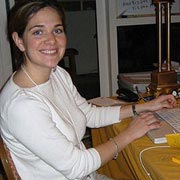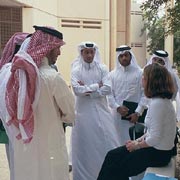
Before the war in Iraq began, the media were already running war drills. Many journalists had done it before. Many had already made a career out of telling stories of world crises. Thirty- and forty-somethings invested their lives in years of turmoil in the Persian Gulf, Kosovo, Somolia and recent conflicts in Afghanistan. They had their work days on war assignment down to routine – always expecting the unexpected.
Their time had been logged, their personal stories told. They had sacrificed whatever it took to be on the front lines. And once again, in the world’s spotlight, cameramen, reporters and producers were ready for the next battle.
But this time, technology and access got journalists closer to the truths of war than ever before.
Then there were some not armored with years of war reporting experience. At 22, Courtney King (IPJ 01) was Nightline’s youngest member of the ABC News team sent to Qatar to cover the war in Iraq.
When King left for Doha, Qatar with ABC’s Nightlineteam on February 28, 2003 she had never seen war nor had planned on ever going to the Middle East. King had just graduated from Georgetown University in May 2002 and taken a job as Nightline’s production coordinator after finishing a semester-long internship there.

As Nightline’s newsroom revved up their war coverage, King insisted on being part of it – not just in Washington, but on location.
“The executive producer would ask me everyday if I was certain I wanted to go. He made me think about it over and over, reminding me that the culture is not like that of the States,” King said.
King never second-guessed her desire. It was an opportunity she did not want to pass up.
Months before leaving, she joined her co-workers in a crash course on CBR (chemical, biological and radiological) training to prepare for their operation. She ordered gas masks and bullet proof vests that packed ABC’s news trucks for biochemical warfare training. This training was a precaution to gear them for the unexpected.
Arriving in Doha after the 17-hour flight, the Nightline crew was escorted to The Ritz-Carlton hotel, which “sat alone on the end of an expanse of nothingness, looking at the Persian Gulf and over the city,” King recounted.
She describes the hotel where the crew made their office space and living quarters as “23 floors of pure extravagance.” Under the chandeliers, men in white robes and women completely covered except for their eyes merged with journalists from all over the world.
King’s crew took over an ABC News operation that had been stationed in Qatar for six months. Her team set up a make-shift office where King worked “the desk,” corresponding with ABC’s foreign desk, Nightline staff and other regional bureaus.
With immense teamwork and changing responsibilities, King aided with shoots, gathered research from wires and papers and worked through the night preparing for the next morning’s live broadcast.
“No one knew what to expect, so we always had to be on our toes ready to jump in and help everything come together,” King said. “Unpredictability was one of the biggest challenges when producers would only know seconds in advance the location their coverage was turning to.”
King found working 24 hours a day was straining and hard to get used to, especially during special events coverage with a 12-hour window to get ready to go on air.
Her crew would get up at 4:30 a.m., after going to sleep at 1 a.m., to be ready to tape at 5 a.m. Everyone worked on a rotation schedule in order to man the headquarters around the clock.
“People actually started referring to night as day – and not just the people on the night shift! It was kind of amusing,” King said. Days became evermore confused since Qataris observe the weekend on Thursday and Friday instead of Saturday and Sunday.
The long days that turned into nights and then into the next day, pushed the pressures of live televison.
“I knew going (to Qatar) would be a huge opportunity for me to become more involved in the production of Nightline at a crucial time in our news coverage,” she said.
King felt the adrenaline of covering the breaking news of the first U.S. missiles launched. As part of Nightline’s team in Doha, King contributed wherever possible, doing makeup for Chris Bury, Nightline’s anchor in Doha, running the teleprompter for George Stephanopoulous for This Week and rushing wires to the live location.
“When you are out in the field, job barriers break down and everyone works together to get the job done well,” King said.
But when the war news grew increasingly difficult to report on, as more news came from the Pentagon in Washington rather than from the Central Command in Doha, the Nightline crew returned to the States on March 25.
“I can only hope that some good will eventually come out of the violence and that there will be more understanding and acceptance between our versions of reality,” she said in an email home while noting that her own perception of reality has indeed changed.
Growing up in Winnetka, Illinois, King attended Georgetown University from 1998-2002 and graduated last spring with a bachelor’s degree in English with a concentration in writing and minors in French and art history. During the summer between her junior and senior year, King was a student in the Institute on Political Journalism and interned at USATODAY.com.
King has returned to ABC’s Washington bureau as Nightline’s production coordinator. She is also the internship coordinator and assistant to Executive Producer Leroy Sievers.
Recently, King has done production work for the 50th anniversary of the first Mount Everest summit and co-produced Nightline’s Memorial Day broadcast, which interweaved interviews with veterans of WWII, Vietnam, and the recent war in Iraq. She will continue to pursue her goals in broadcast journalism while taking advantage of every chance she can get to travel, explore new places and learn new perspectives from people and places around the world.
After running the drills on assignment and feeling the adrenaline of war reporting, King now has her own story to tell.
“Learn from others’ experiences,” she says. “If you want to be a journalist, start being one now.”

